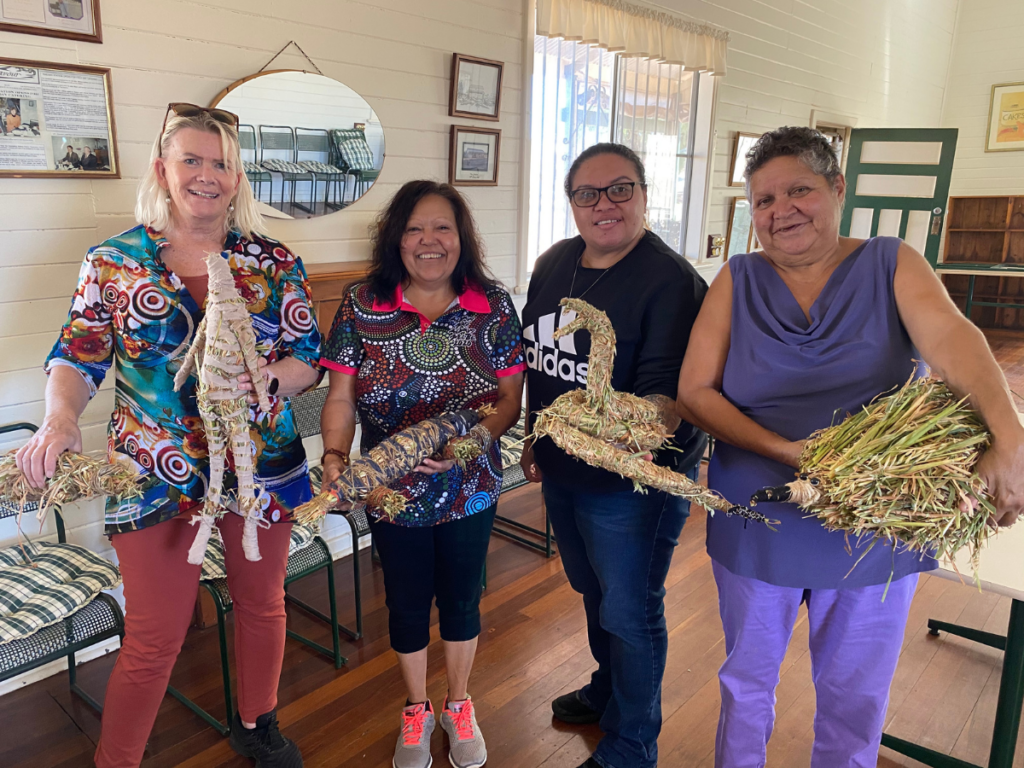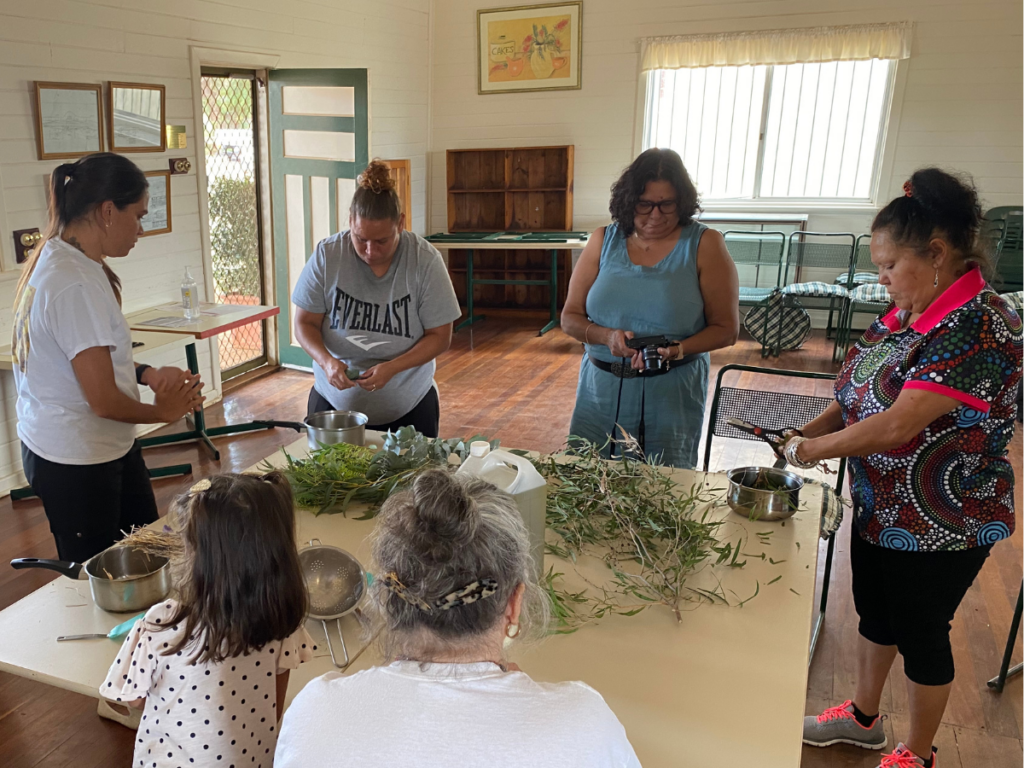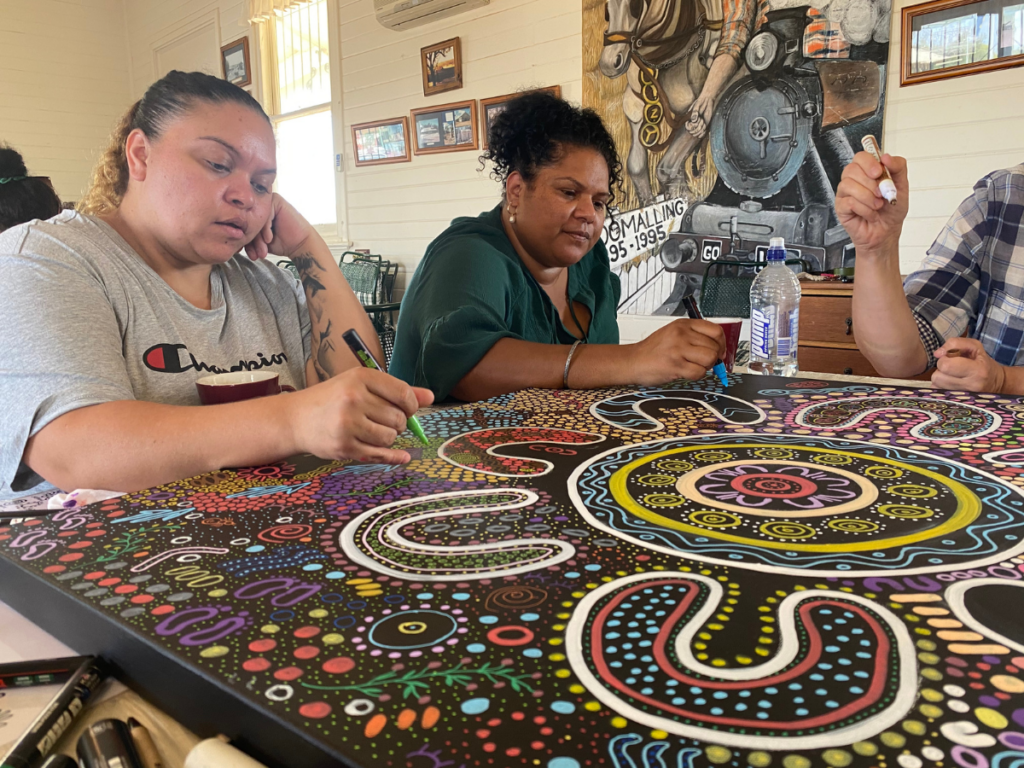Foundation for Rural & Regional Renewal (FRRR)
Workshops for women
Goomalling Aboriginal Corporation in the Wheatbelt region of Western Australia, used their $19,605 In a Good Place grant, funded by CCI Giving for their project called Maangart Yorga (Jam Tree Woman) – a workshop series delivered over the course of a year to impart both traditional and life skills to Aboriginal women and girls.
The program was created for Aboriginal women experiencing poverty, isolation, domestic violence and mental health concerns, and Aboriginal girls, from twelve years old, who are at risk. The program aimed to increase social participation by providing relevant and culturally appropriate workshops and a culturally safe space for connectedness. The workshops enabled the re-emergence of yarning circles and connection to Country that has helped foster relationships with young Aboriginal girls and Elders and provide an ongoing support network.
Maangart Yorga was an initiative to provide a safe space for women and girls to come together, learn, share and connect. Delivered through a series of workshops over a year, the aim was to increase participation in social activity, enhance the sense of community connectedness, improve outlook and help participants make healthier choices.
The workshops included a wide variety of traditional art, yoga and meditation, and health and wellbeing presentations. A series of practical skills sessions and workshops were held for women to have greater confidence, such as:
The organisation reported that participants would come to the workshop filled with apathy, tiredness or stressed, but always left feeling fulfilled and empowered after each workshop. The workshops provided a set of skills that can be transferred amongst the community.
While the workshop roll-out was interrupted by maternity leave for the program manager, the silver lining was that her leave coincided with movement restrictions due to COVID, so there was no additional impact from the pandemic.
Sadly, participation rates were lower than expected due to deaths in the community of two female elders and the suicide of two young Aboriginal men. Grieving periods were long and resulted in non-attendance from some members. For some members, the Maangart Yorga was a saving grace and gave them something positive to focus on.
Overall, 16 women participated across the program (including 2 non-Indigenous ladies), with a good cross section of ages from 21 years to 61 years old. Four female Aboriginal facilitators, three local female non-Indigenous facilitators, and two local female-owned food businesses also benefited from the project.
The greatest success of the program was providing a consistent and safe space for women to meet and yarn about their experience, which assisted healing and created lasting connections. The group plans to continue to meet monthly to use some of the skills they’ve learned and to continue connecting with each other. The Council is working with the Goomalling Aboriginal Corporation to create a permanent space for the women to take ownership of so they can create and share culture.
Queensland Rural, Regional and Remote Women’s Network (QRRRWN) is a member and volunteer based, multi-generational, not-for-profit organisation for women from, or supportive of rural, regional and remote (RRR) areas, across all sectors and industries. Their focus is on building strong and diverse communities through connecting, developing and inspiring RRR women.
In 2018 they received $5,000 from FRRR’s Small Grants for Rural Communities program, funded by the David Mactaggart Foundation to fund a history project as part of their 25th anniversary, which was celebrated at the QRRRWN annual conference in Kingaroy.
The project paid tribute to the QRRRWN women whose vision 25 years ago helped shaped the organisation as it stands today, as well as the communities they live in. Interviews were conducted with past and present QRRRWN women, and featured their stories, wisdom and achievements in a series of videocasts. These snapshots of the life of the organisation were launched at the QRRRWN 2018 Conference as part of an exhibit featuring memorabilia from the last 25 years.
There is also now a history page on the QRRRWN website, with a series of videocasts that members, prospective members, as well as the general public, can view. This history webpage hosts the previously hidden collections of QRRRWN history that can be viewed as slideshows: https://www.qrrrwn.org.au/history-project/.
Project lead and QRRRWN board member Dr Cecily Jensen-Clayton said that years of drought, economic downturn, cyclone damage and the shrinking of rural communities have led to a loss of energy and motivation in leadership.
“The greatest success from my perspective was the performance and effectiveness of the history project team. What I am most proud of is that these outcomes are enduring, these outcomes being legacies that continue to energise leaders, their communities, and the QRRRWN organisation.”
One significant benefit of the history project was that it showcased to younger members the greater capacity and capabilities of the organisation. One millennial board member has now gone on to take up an executive position this year, and other participants were gifted with new and different ways to think about using their voice as leaders, commensurate with the objectives of the organisation.




